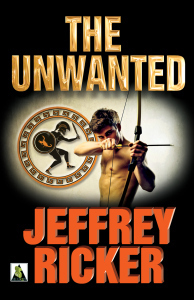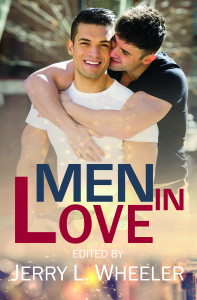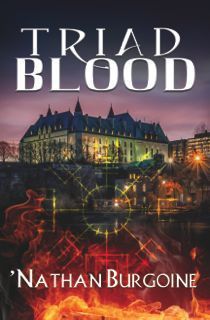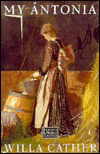Jeffrey Ricker's Blog, page 21
March 30, 2016
Wednesday Links; also, Saints & Sinners
Tomorrow morning at “where’s the sun”-thirty, we’ll be hitting the road for New Orleans and the Saints & Sinners Literary Festival. I suppose I should start packing, shouldn’t I?
If you’ll be down there, I’ll be giving a reading at 10am on Saturday at the Hotel Monteleone—I guess I should decide what I’m going to read, right?—and then at 1pm (same day, same place) I’ll be on a panel moderated by Candice Huber, “Creatures of the Night,” talking about the horror genre and its intersection with queerness. (I always feel smart when I use the word “intersection” and I’m not talking about streets.) Actually, I’ll probably be doing more listening than talking because the people on the panel have lots more experience than I do (but ask me sometime about the paranormal detective vampire idea I’m working on…). Anyway, if you see me, say hello!
Right, let’s move on, shall we?
“One of the great rights of the private individual is that she or he should have the power to choose when to put something out into the world: when to speak and when to be silent. As a dear friend always reminds me, Is this the hill you really want to die on? As I get older, the act of writing and making art has become inseparable from choosing what to say, when to say it, and to whom. For me, art, literature and the best journalism are not simply mirrors held up to society or the individual; aware of all that goes unspoken despite our media-saturated culture, they contribute, with conscience, to an entirely other book of history.” “The Private Self in the Public Domain” by the wonderful Madeleine Thien. If you haven’t read her novel Dogs at the Perimeter, it’s fantastic. And look forward to her new one, Do Not Say We Have Nothing, coming out this year.
“My grandmother’s bookstore was one of the most glamorous and peaceful places I could imagine.” My friend Anna Ling Kaye writes about her love for indie bookstores, something we share in spades.
Finally, go read “Sleepy Mom” at Tin House.


March 29, 2016
It’s drafty in here
There were times I thought I’d never get to the last page of this thing. There have been many instances where I found myself thinking, “This is going to be a drawer book.” Mind you, I already have a few of those. I still worry that the novel I wrote in grad school might wind up in there with all of the other things that have somehow not turned out.

In case you forgot what my previous novel looked like…
But anyway. My point, and I do have one, is that I’ve finally finished the first draft of the sequel to The Unwanted (which you should totally buy, by the way). It’s about 10,000 words shorter than I expected it to be and it’s littered with parenthetical revision notes to myself, most of which say [FIX THIS]. So the work’s not done yet. However, I’m going to enjoy the sense that I’ve actually accomplished something for at least the rest of the afternoon.
And by “enjoy” I probably mean “have a glass of wine.”


What Goes Where, or the Making of Men in Love
Over at the Bold Strokes Books author blog, Jerry Wheeler pulls back the curtain on how editors decide what goes where in a short fiction anthology—in this case, the upcoming Men in Love, which you can preorder from Bold Strokes here. Jerry says he was only marginally unhappy with one transition between two of the stories in the anthology; he doesn’t say which, but do you think you can guess which one?
 Bold Strokes Books Authors' Blog
Bold Strokes Books Authors' Blog
 Men in Love is my sixth anthology – four for Bold Strokes and two for Lethe Press – so you’d think I’d have learned something about editing anthos by now. You’d be wrong. Oh, I have a solid grasp of the process, but each one is different. Men in Lovewas a terrific experience because I got to work with several writers I already admired and respected, plus I found some new writers I wasn’t aware of. I was recently interviewed about MIL by ‘Nathan Burgoine, who asked how the stories were selected and ordered, an aspect of editing anthologies no one talks about. It’s not a secret, it’s just that so few care. However, I am here to plug that information gap.
Men in Love is my sixth anthology – four for Bold Strokes and two for Lethe Press – so you’d think I’d have learned something about editing anthos by now. You’d be wrong. Oh, I have a solid grasp of the process, but each one is different. Men in Lovewas a terrific experience because I got to work with several writers I already admired and respected, plus I found some new writers I wasn’t aware of. I was recently interviewed about MIL by ‘Nathan Burgoine, who asked how the stories were selected and ordered, an aspect of editing anthologies no one talks about. It’s not a secret, it’s just that so few care. However, I am here to plug that information gap.
I received a total of sixty-eight stories through an open call placed on several M/M romance sites as well as the BSB website…
View original post 488 more words


March 28, 2016
You are more than your writing
Literary agent Kristin Nelson sends out a monthly newsletter (I think it’s monthly—I should pay better attention!) with news about her agency, her writers, and tidbits about the writing industry in general. It’s really worthwhile and often entertaining; consider signing up for it here at her agency’s website.
Anyway, in her February newsletter, she talked about a talk (ha!) she gave to MFA students at Regis University, and the topic of rejection came up. I know, imagine that! You’d be forgiven for thinking writers are rejection junkies, considering how often we go out of our way to court it. It can be frustrating, for sure.
But here’s the thing Kristin mentions and I agree with: A rejection is often not a commentary on your writing talent.
I won’t repeat all of the reasons she gives, because instead I can just link to last month’s newsletter and let you read it all for yourself.
Writing is personal. You put a lot of yourself into what winds up on the page. (And if you don’t, well, I don’t know what to say to that.) But your reaction to the business of writing shouldn’t be. And yes, I do know how hard that is. I frequently forget to follow my own advice. And let’s face it, it’s not even my advice, it’s Kristin Nelson’s advice.
But it’s still good advice.


March 23, 2016
Wednesday Links: Troubling tropes, death flowers, and cats who steal knickers
Okay, I’ve got one more chapter to go on the first draft of Prophecy Boy and I want to get it done by April 1, so let’s just jump right in, shall we?
First, read what my colleague ’Nathan had to say about the “gay for you” fiction trope, bi erasure, and lots of other problematic things in fiction. The main takeaway: No one can tell you what to write, but caveat scriptor; people are free to let you know just what they think about it, too.
 (Also, ’Nathan has a new novel coming out very soon: Triad Blood, a queer horror novel that I can tell you will be very, very good, ‘cause I’ve read bits. Check it out here.
(Also, ’Nathan has a new novel coming out very soon: Triad Blood, a queer horror novel that I can tell you will be very, very good, ‘cause I’ve read bits. Check it out here.
This is a haunting science fiction story: “Death Flowers of a Never-Forgotten Love” at Apex magazine.
Via my friend Kara, Thirteen Creative Writing Exercises for Women, at McSweeneys. (#12 speaks to me.)
There has got to be a story in here. I think I’m going to write it. (But it’ll be a little bit gay. [Okay, a lot gay.])
Belatedly, a eulogy to Alan Rickman, “He Made Snape Sexy.” Yes, yes he did. (Best line: “Alan Rickman made me the kinky transfag that I am today.”)
Lastly, a story by my friend J.M. Landon, “Elk’s Baby.”
Now, as my friend (and editor) Greg would say, back to the spice mines.


March 21, 2016
When patience is a virtue you have no time for
So, I’m trying to grow my hair out.
Oh, brother, I hear you say. What does this have to do with writing?
Hang on, I’m getting there.
Back in 2014, I finally let my hair get long enough to send it off to a charity that makes wigs for kids who are cancer patients. Granted, there was more than a little bit of gray in my hair at that point, but they dye it all anyway, I think.
Anyway, after I got my head buzzed and sent all that hair off to someplace in Langley, B.C., I breathed a huge sigh of relief, because my hair just about drove me crazy. It is not easy to figure out what to do with it, most of the time it was too short to get all of it into a ponytail, and at the least sign of humidity that stuff frizzes like no business.
Reminder, at the time, I was in Vancouver, British Columbia. Is it humid there? A little.
In the grand scheme of things, hair is not a big deal. But the extent to which it about near sent me up the wall reveals one of my character traits—and if I’m honest, one of my character flaws: I am so, so impatient.
As a kid, I got used to hearing people tell me “patience is a virtue you’re short on.” Or was it “short on all virtues”? Maybe I wasn’t listening closely enough. I’m sure they said this out of love. (Let me hang onto that delusion, all right?) I’m sure they were also correct. That Carrie Fisher quote, “Instant gratification takes too long”? Really resonates with me. Could I have been that kid in Willie Wonka who wants everything now now NOW? Well, hopefully I’m not that obnoxious about it. (Maybe.)
When people do ask how the writing for Prophecy Boy is coming, I usually respond with “it’s fine, but I wish I were done because I’m really excited about book three.” And then there’s the other book that I started in November that I want to get back to as well.
I want to do them all at once and I know I can’t do that, so in the back of my head is the voice telling me to get a move on go go GO so I can get it done and focus on the next one.
See? Impatient.
Nothing good ever came from rushing a job, I know that. So I keep trying to talk myself back from the brink and just focus. Sadly, this only works up to a point.
When I need another reminder that rushing gets me nowhere, I do what I always do: Look to other people who are or were, perhaps, smarter and wiser and (most likely) more patient than I am for words of advice:
“He that can have patience can have what he will.” — Benjamin Franklin (and this needs to be updated to less sexist language)
“Patience is bitter, but its fruit is sweet.” — Aristotle (here’s hoping the tree survives)
“Trees that are slow to grow bear the best fruit.” — Molière (cribbing from Aristotle, perhaps?)
“The strongest of all warriors are these two — Time and Patience.” — Tolstoy
“Remember you are half water. If you can’t go through an obstacle, go around it. Water does.” — Margaret Atwood


March 18, 2016
#FridayReads: Willa Cather and an anniversary that almost slipped past me
 My Ántonia is the third Willa Cather novel I’ve read, including her other “prairie trilogy” (I’ve also seen it called “Great Plains trilogy”) novels O Pioneers! and Song of the Lark. I’ll confess I didn’t know much about the author herself until very recently (like, this morning). I don’t know why I was so incurious about her background and history, considering how much I’ve enjoyed the novels I’ve read. There’s a bleakness and at the same time an intensity of emotion in them, and I was interested to learn she wasn’t married and her closest relationships during her life were with other women.
My Ántonia is the third Willa Cather novel I’ve read, including her other “prairie trilogy” (I’ve also seen it called “Great Plains trilogy”) novels O Pioneers! and Song of the Lark. I’ll confess I didn’t know much about the author herself until very recently (like, this morning). I don’t know why I was so incurious about her background and history, considering how much I’ve enjoyed the novels I’ve read. There’s a bleakness and at the same time an intensity of emotion in them, and I was interested to learn she wasn’t married and her closest relationships during her life were with other women.
Through Jim Burden’s endearing, smitten voice, we revisit the remarkable vicissitudes of immigrant life in the Nebraska heartland, with all its insistent bonds. Guiding the way are some of literature’s most beguiling characters: the Russian brothers plagued by memories of a fateful sleigh ride, Antonia’s desperately homesick father and self-indulgent mother, and the coy Lena Lingard. Holding the pastoral society’s heart, of course, is the bewitching, free-spirited Antonia.
Originally published in 1918, the book is available through Project Gutenberg.
 On a completely unrelated note, The Unwanted came out two years ago today (although careful readers could get it directly from the publisher at the first of the month). I guess that officially makes my YA fantasy novel a toddler, so I expect it to gambol around, knock things over, and babble a lot. Kind of like me before I’ve had my coffee.
On a completely unrelated note, The Unwanted came out two years ago today (although careful readers could get it directly from the publisher at the first of the month). I guess that officially makes my YA fantasy novel a toddler, so I expect it to gambol around, knock things over, and babble a lot. Kind of like me before I’ve had my coffee.
If you haven’t checked it out yet, the ALA’s GLBT Round Table had nice things to say about the novel after it came out.
I’m almost done with the first draft of the sequel—my goal is still to have that done by April 1, and I’ve got about a chapter and a half to go. I would say I’m writing as fast as I can, but ha! Anyone who knows me will attest that I’m great at procrastinating, waffling, and dithering back and forth. But still, April 1. Done.
And then the second draft will start….


March 16, 2016
A thousand? A thousand
Holy cow! This is my 1,000th post on this blog. (In interest of full disclosure, it’s probably the 1,002nd post, because there are two posts I wrote but never published, but we’ll just go with 1,000 because it’s a nice, round number.) Anyway, a thousand days of random mutterings and half-baked ideas over the course of (pauses to check archive)—
Wow. Ten years. And there were six years before that when I kept a blog at various different other places on the Web. If you’re wondering, the most popular post was this one back on March 25, 2008, when blogs were, if not shiny and new, at least not as tarnished and dented as they are now, and mentioning Walmart and linking to CNN apparently got random people’s attention. Now I have CNN blocked in my web browser because the reader comments make me stabby and I don’t blog nearly as often and on fewer random things.
No, really, I’m a lot more focused now.
So thanks for coming along for the ride. Now go read something else! You might want to check out a few of these things that caught my interest this week:
This article on Book Riot about weeding your Goodreads to-read shelf inspired me to do just that. It’s down from 300-plus to sixty something, which I feel like I might actually have a chance of reading before
I love listening to Damian Barr’s Literary Salon, which gets a lovely write-up in Vanity Fair along with a very cool painting done live at the event at the Savoy.
Did you know dolphins are deep thinkers?
Would you upload your mind if you could? This is really interesting to me because it gets at a subplot in a science fiction novel I wrote.
5 queer-friendly comics publishers you should know about. One of them, Northwest Press, also published Lavender Menace, which, while not a comic, includes a story by yours truly.
Lastly, via Austin Kleon comes this awesome video of one of my favorite New Order songs. As an aside, there’s a great mashup of “Blue Monday” and Kylie’s (don’t ask which Kylie, THERE IS ONLY ONE) biggest hit called, appropriately, “Can’t Get Blue Monday out of My Head.” How is it possible that “Blue Monday” came out 33 years ago? Am I that old?
Well, yes, I am.
There’s another milestone of sorts coming up on Friday, but more on that later.


March 14, 2016
Why all writing advice books are bad—and good, too
A while back I finished reading a book on writing, which I picked up when a friend referenced it in a post on Instagram. It’s a book that’s received loads of accolades and is often referred to in the same breath as Stephen King’s On Writing (which I haven’t read yet, but really want to). So, I had high hopes for it.
I won’t say I hated it, because I didn’t. But it left me… disappointed. And I figured out why when I turned to the bio. The writer was a former Marine. (OK, first of all, my dad’s a Marine and you never say you’re a former Marine. Marines don’t retire, they just stand down. But anyway.) And it’s not like Marines are automatically disqualified from giving advice on writing; hell, some of the best advice I’ve been given on that topic (or any topic) has been from my dad.
But.
I think (of course I think this) that my dad is a particular kind of Marine, one who didn’t quite drink all of the Kool-aid, if that makes sense. He doesn’t have the tendency to impart his advice as battle knowledge, thankfully. There was a lot of combat metaphor laced throughout the book, and while it was full of good advice, the pacifist in me wasn’t on quite board with the delivery.
Not every book is for everyone, and I think that’s especially true for books of advice on any topic. That doesn’t mean it was a bad book. It just might not be what I needed at that particular time. Any book on writing may not be what you need, either. Don’t feel like you’re not doing it right if that’s the case. Just keep looking.
And with any book on writing, there’s a point beyond which any of its advice won’t work. And that’s the fact that you have to do the writing yourself. You can read those books ad nauseam (heaven knows there’ve been times when I have), but eventually you have to put them aside and pick up your own pen (or your laptop, or your pencil—whatever you write with) and work on your own book.
And the thing about that writing book that wasn’t right for me? In his preface the writer said a lot of people probably wouldn’t be able to relate to the last part of the book, and that if they stopped before they got to that, they would still find the book useful. I’m glad I didn’t stop, because that part, where he delves into his spiritual connection with his writing, was the part that clicked the most for me. Just goes to show, you never know.
What’s your favorite book on writing? E-mail me and let me know! I’m always updating my list for my own reading edification, and I share it with my students, too.


March 9, 2016
What I’m reading when I’m not writing
Here’s a funny thing: You know how last year I said my goal was to read books by not so many white people? I did okay on that goal, but this year, when I’m in Project Read My Own Damn Books mode, I seem to be doing better at making my reading list more equitable than I did in 2015. Out of the seven books I’ve read this year, four are by writers of color. At the moment I’m reading a book by Willa Cather, but the next two upcoming books are by writers of color.
I’m not trying to toot my horn here and say “oh, look how good I’m being.” Because ugh, that’s boring. What’s interesting to me is that maybe a year focusing on prying off my own blinders has helped me keep casting my reading net wider.
(Way to mix metaphors, Ricker. Are you sure you’re a writer?)
Shut up, inner voice. And no, I question myself all the time, but more on that some other time. Also, shut up.
I think you should totally read what you want, but at the same time ask yourself, how do you know what you don’t want to read? If you want to keep up with my ongoing reading list for 2016, you can check it out here or here.
Anyway! I’m adding Matt Bell’s Baldur’s Gate II to my list after reading this article in the Los Angeles Review of Books. Matt was a visiting writer at the Vermont Studio Center when I was there, and was incredibly friendly and generous with his time. His book In the House upon the Dirt between the Lake and the Woods is already on my to-read list, and his latest book, Scrapper, has been getting good reviews.
Some valuable perspective. Read Claire Fuller’s “Some things I’ve learned in my year of being published.”
And for a lot of perspective, read “You Will Be Tokenized”: Speaking Out About the State of Diversity in Publishing.
Lastly, a story I read last year that I reread for a class I’m teaching and still love: “The Quiet Thing” by Che Yeun.





